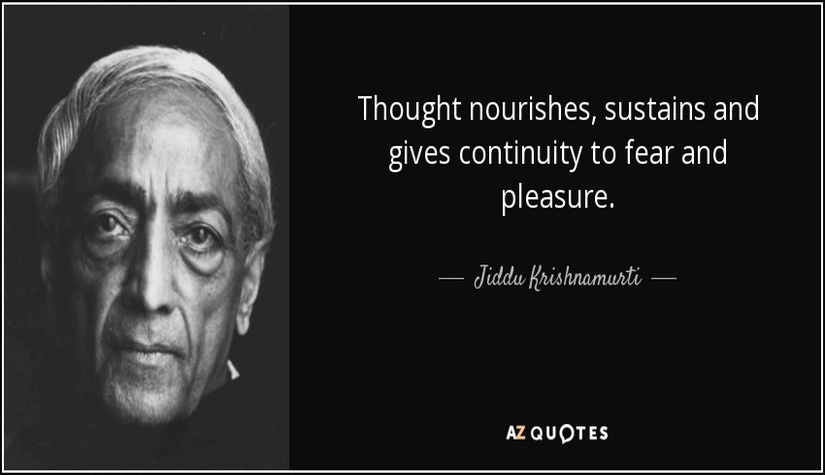INTRODUCTION
Jiddu Krishnamurti (1895 – 1986), though he denied any titles, was a philosopher and an eminent writer and speaker on philosophical and spiritual issues, including human relationships, psychological revolution, the nature of the human mind, consciousness and evolution, meditation, and bringing about positive social change. He was a socialist in his approach in maintaining that society was ultimately the product of the interactions of individuals, he held that fundamental change in society could emerge only through freely undertaken radical change in the individual (Krishnamurti, 2008, pg.11). He stressed and asserted the need for a revolution in the psyche of every human being and posited that such a revolution could not be brought about by any external entity, be it religious, political, or social. He propounded that such change had to be brought about by a holistic transformation from within, and an insight into the various layers of one’s consciousness (Krishnamurti, 1987, pg.7). Born into a Telugu family, in what was then colonial India, he lived, in his early adolescence, next to the Theosophical Society headquarters at Adyar, in Chennai (earlier, Madras). He then came in contact with influential theosophists, Annie Besant and C.W. Leadbeater, who educated him, believing him to be a future spiritual leader. However, Krishnamurti later dissolved and broke away from the Theosophical Society and travelled internationally as an independent speaker and writer on fundamental human issues. Krishnamurti spoke on various subjects and topics, but did not expound on one particular philosophy, he spoke about issues that would address day to day human conditions.
PLEASURE
J. Krishnamurti differentiated pleasure from joy, and for various reasons, he considered the pursuit of joy as a higher goal than the pursuit of pleasure. He invited his audiences to envision and imagine if it was possible to live in a world that is bereft of pleasure but filled with joy and bliss.
Krishnamurti elaborates on the various kinds of pleasure that one indulges into and of various degrees and forms.
We are all engaged in the pursuit of pleasure in some form or other – intellectual, sensuous or cultural pleasure, the pleasure of reforming, telling others what to do, of modifying the evils of society, of doing good – the pleasure of greater knowledge, greater physical satisfaction, greater experience, greater understanding of life, all the clever, cunning things of the mind – and the ultimate pleasure is, of course, to have God.
(Krishnamurti, 1969, p.45)
According to Krishnamurti, the structure of society is based on pleasure. He states that from childhood to death people are secretly pursuing pleasure. He says that it is important for each individual to investigate the question of pleasure very closely. He affirms that pleasure is a basic demand of life and without it, existence becomes ‘dull, stupid, lonely, and meaningless’ (Krishnamurti, 1969, p.46).
Krishnamurti makes an argument about why one should investigate the question of pleasure, because it guides and shapes one’s life and is therefore very important. He makes an argument against pleasure for a simple reason that ‘pleasure brings pain, frustration, sorrow and fear, and out of fear violence’ (Krishnamurti, 1969, p.46). He states that it is an individual’s choice about how to live their life, they can choose to live in pain and sorrow, which according to him, most of the world anyways chooses to live like, or, he proposes another wiser choice, to live a life which is free from sorrow but for which, he offers, one has to understand the structure of pleasure.
He says that to understand pleasure, one doesn’t have to deny or condemn it, or to judge it as right or wrong, by knowing it, one will lead to its shadow, i.e., pain.
To understand pleasure is not to deny it. We are not condemning it or saying it is right or wrong, but if we pursue it, let us do so with our eyes open, knowing that a mind that is all the time seeking pleasure must inevitably find its shadow, pain. They cannot be separated, although we run after pleasure and try to avoid pain.
(Krishnamurti, 1969, p.46)
Krishnamurti questions the reader and invites them to ponder about why the mind always demands pleasure, and why does it do various noble and ignoble things with the undercurrent of pleasure, and why we sacrifice and suffer on the thin thread of pleasure, he further questions about the nature of pleasure and how it comes into being. He wonders if the reader has asked these questions and have followed the answers and where it leads at the end.
Krishnamurti proposes a theory of about how pleasure comes into being, he proposes a four-stage theory.
Pleasure comes into being through four stages – perception, sensation, contact and desire. I see a beautiful motor car, say; then I get a sensation, a reaction, from looking at it; then I touch it or imagine touching it, and then there is the desire to own and show myself off in it. Or I see a lovely cloud, or a mountain clear against the sky, or a leaf that has just come in springtime, or a deep valley full of loveliness and splendour, or a glorious sunset, or a beautiful face, intelligent, alive, not self-conscious and therefore no longer beautiful. I look at these things with intense delight and as I observe them there is no observer but only sheer beauty like love. For a moment I am absent with all my problems, anxieties and miseries – there is only that marvellous thing. I can look at it with joy and the next moment forget it, or else the mind steps in, and then the problem begins; my mind thinks over what it has seen and thinks how beautiful it was; I tell myself I should like to see it again many times. Thought begins to compare, judge, and say ‘l must have it again tomorrow’. The continuity of an experience that has given delight for a second is sustained by thought.
(Krishnamurti, 1969, p.47)
THOUGHT
Krishnamurti states that it is same with sexual desire or any other form of desire. He says that there is nothing wrong with desire and to react is perfectly normal but it is the thought that turns the delight or desire into a pleasure. It is the thought that wants to make one repeat the experience, and the more one repeats it, he says, the more mechanical it becomes. He further says that the more one thinks about the pleasure, the more strength the thought gives to the pleasure. So, the ‘thought creates and sustains pleasure through desire, and gives it continuity, and therefore the natural reaction of desire to any beautiful thing is perverted by thought’ (Krishnamurti, 1969, p.48).
He says that the thought is never new, for thought is the response of memory, experience, knowledge. Thought, because it is old, makes the thing which one has looked at with delight and felt tremendously for the moment, old. From the old one derives pleasure, and never from the new. There is no time in the new. There is a struggle to repeat and perpetuate pleasure, and therefore it turns into pain. He further says that the thought turns pleasure into a memory and the memory is then nourished by thinking about it over and over again.
MEMORY
Krishnamurti says that memory has a place at a certain level of our being and without which we cannot function in everyday life. According to him, memory plays a very important role and is efficient but also there is a state of mind where the memory has a very little place. He further states that ‘a mind which is not crippled by memory has real freedom’ (Krishnamurti, 1969, p.48).
He says that anything that is the result of memory is old and therefore never free and therefore is no freedom of thought.
Have you ever noticed that when you respond to something totally, with all your heart, there is very little memory? It is only when you do not respond to a challenge with your whole being that there is a conflict, a struggle, and this brings confusion and pleasure or pain. And the struggle breeds memory. That memory is added to all the time by other memories and it is those memories which respond. Anything that is the result of memory is old and therefore never free. There is no such thing as freedom of thought. It is sheer nonsense.
(Krishnamurti, 1969, p.49)
FEAR
He invites the reader to observe of what happens when one is denied a little pleasure. When one doesn’t get what they want and they become anxious, envious, and hateful. He invites one to noticed what happens when one have been denied the pleasure of drinking or smoking or sex or whatever it is, what battles one goes through. He says that that battle is a form of fear. He says that one is afraid of not getting what one wants or of losing what one has.
When some particular faith or ideology which you have held for years is shaken or torn away from you by logic or life, aren’t you afraid of standing alone? That belief has for years given you satisfaction and pleasure, and when it is taken away you are left stranded, empty, and the fear remains until you find another form of pleasure, another belief.
(Krishnamurti, 1969, p.50)
JOY
Krishnamurti states that where there is a search for pleasure there must be pain, he warns the reader to live that way if they want to, but not to slip into it. He suggests that if one wants to end pleasure, which is to end pain, one must be totally attentive to the whole structure of pleasure – not cut it out as monks and sannyasis do, never looking at a woman because they think it is a sin and thereby destroying the vitality of their understanding – but seeing the whole meaning and significance of pleasure. Then only one will have tremendous joy in life. One cannot think about joy. Joy is an immediate thing and by thinking about it, one turns it into pleasure. ‘Living in the present is the instant perception of beauty and the great delight in it without seeking pleasure from it’ (Krishnamurti, 1969, p.51).
References
- Krishnamurti J. The Awakening of Intelligence. New York: Harper One Publishers; 1987.
- Krishnamurti J. Freedom from the Known. London: Krishnamurti Foundation Trust, UK; 1969.
- Krishnamurti J. In the Problem is the Solution: Question and Answer Meetings in India. Chennai: Krishnamurti Foundation; 2008.

